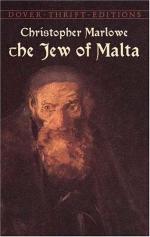|
This section contains 4,842 words (approx. 13 pages at 400 words per page) |

|
In the following essay, Kermode explores Marlowe's and other playwrights' Jewish characters as agents of social criticism in English theater in the late sixteenth century.
When the London theatergoers of the 1590s made the short river trip to the South Bank, they left behind them a place which displayed certain fixed features (infrastructure, Protestant Christian ideology), and a place where the lives of the lawmakers and law-followers were affected by the political machinations of international relations and historical placement (tension between London and Spain, proximity to the economically and ideologically important Netherlands). Where they went, to the Rose or the Globe, were places with fixed features (the walls, the stage, the galleries, Protestant Christian ideology) and where the lives of those who performed, those who were portrayed, and those who watched were affected by the political and religious machinations in England and abroad (the sensitivity of the...
|
This section contains 4,842 words (approx. 13 pages at 400 words per page) |

|




